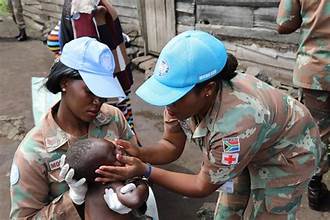As dawn breaks over Nyiragongo General Referral Hospital, situated just north of Goma, Democratic Republic of Congo (DRC), healthcare workers are already deeply engaged in their day’s work. The facility is a frontline site for the treatment of mpox, a viral disease that has seen a resurgence in the region. Despite the early hour, the medics move with practiced efficiency, screening, isolating, and caring for patients who have been infected by the highly contagious disease.
The urgency of their work has been underscored by a recent global alert. Just two days earlier, the World Health Organization (WHO) issued its highest-level alert for mpox following a declaration by the Africa Centres for Disease Control and Prevention (Africa CDC), labeling the outbreak as a continental emergency. This heightened global awareness, however, does little to ease the daily realities faced by the doctors in DRC, who have been battling this latest outbreak since 2022. Their efforts are compounded by chronic medicine shortages, ongoing conflict in the eastern part of the country, and the toll of years spent combatting Ebola epidemics.
At Nyiragongo Hospital, the flow of patients seeking care for various ailments is constant. Amidst this influx, a dedicated team of hygienists and healthcare providers works tirelessly in a designated white tented area. Here, mpox patients are carefully isolated to prevent the spread of the virus.
One of the patients is Madam Nyota Joyeuse, a 35-year-old shopkeeper and mother of two. A week ago, she began experiencing symptoms, including a headache, fever, muscle aches, and mild flu-like symptoms. Initially, she assumed it was malaria, a common illness in North Kivu. However, as her condition did not improve, she decided to visit the hospital.
“When I was told I had mpox, it felt like the world was collapsing around me,” she tells Al Jazeera, expressing her concerns about her declining health and the potential impact on her business. Despite her initial fears, Madam Nyota is now receiving treatment and is hopeful about her recovery. “The treatment is helping, and for that, I am grateful. May God bless those who care for us,” she says from her hospital bed.
The disease, originally named “monkeypox” when first identified in monkeys in 1958, was renamed “mpox” in 2022 to mitigate the stigma associated with the original name. Endemic to parts of Central and West Africa, mpox is related to the virus that caused smallpox, which was eradicated decades ago. In severe cases, mpox can be fatal.
Although outbreaks are not uncommon in DRC, health experts have noted a disturbing increase in cases, attributed to a new strain known as clade 1. This strain is spreading more rapidly and extensively than its predecessors. The WHO recently reported that mpox cases have been identified in 13 African countries, as well as in Sweden, Pakistan, and the Philippines. The Africa CDC has observed a 160 percent increase in cases in 2024 compared to the same period last year.
In the DRC, mpox has been detected across all 26 provinces. As of last week, the country had recorded over 15,000 cases of mpox, with 548 fatalities reported this year alone. At Nyiragongo Hospital, medical director Badiambila Mulumba reports that the facility began treating mpox patients in June and has since managed 278 cases, both positive and negative. As of August 10, the hospital is treating 78 confirmed positive cases, with no reported deaths so far.
Despite the significant challenges, the medics at Nyiragongo General Referral Hospital continue their relentless fight against the growing mpox outbreak, providing critical care to those affected and working to contain the spread of this virulent disease.



